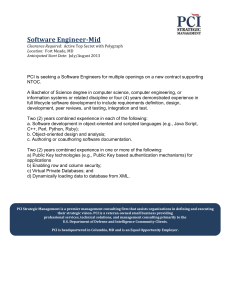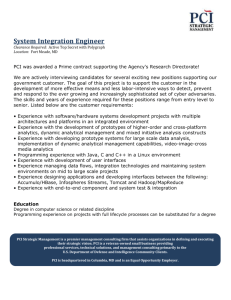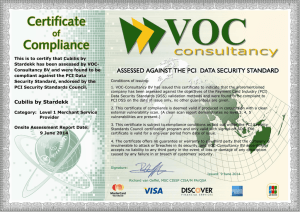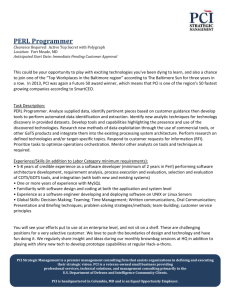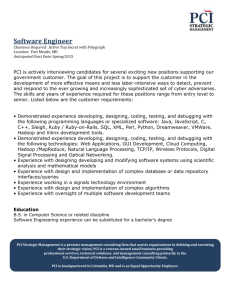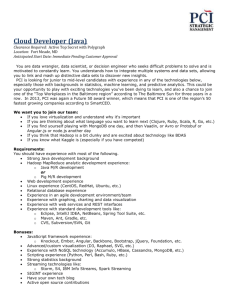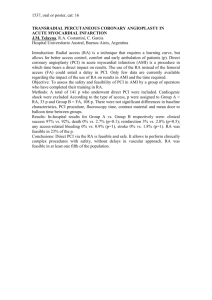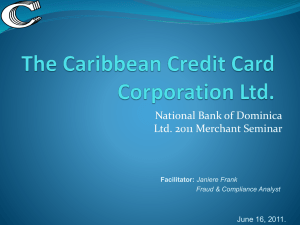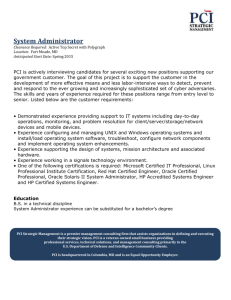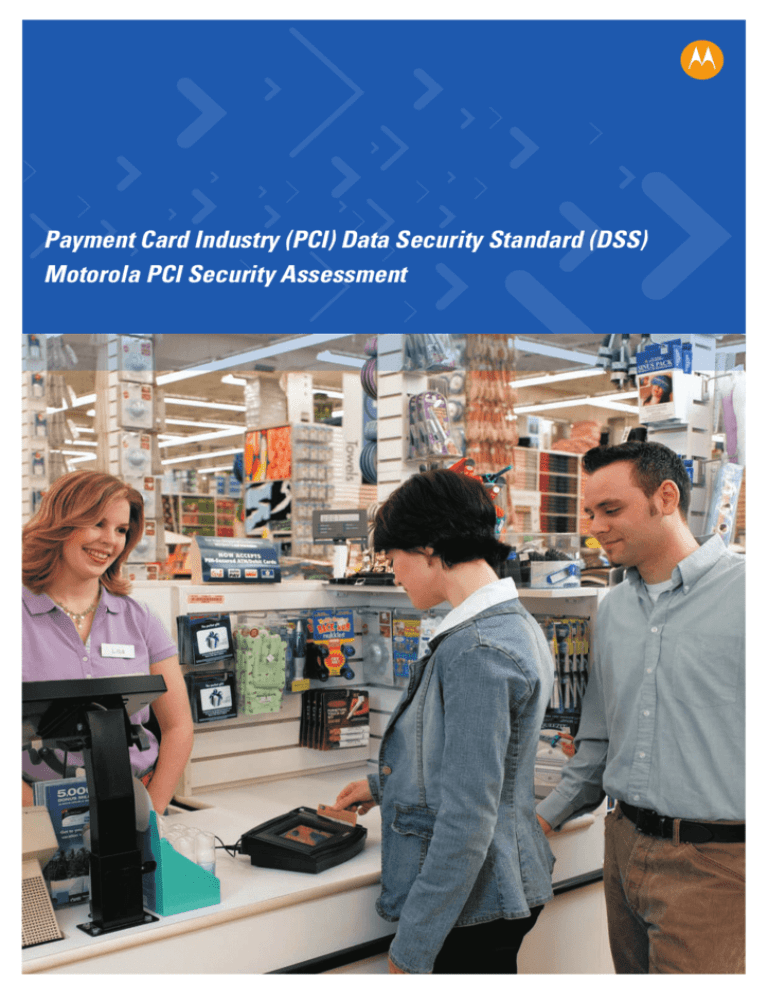
Payment Card Industry (PCI) Data Security Standard (DSS)
Motorola PCI Security Assessment
Retail establishments have always been a favorite target of thieves and shoplifters, but today’s
worst criminals never even enter the store. They can be out on the sidewalk or even thousands
of miles away on a different continent, utilizing the Internet and wireless connections to gain
access to your most precious assets – your customer records and payment card numbers. The
Payment Card Industry (PCI) Data Security Standard (DSS) is a worldwide mandate designed
to protect retail customers‘ records and payment card numbers from unauthorized access. The
cost of non-compliance is high — measured in high fines, the high cost of consumer lawsuits
and brand damage. Achieve compliance and protect your customers, as well as your profitability
with Motorola’s PCI Security Assessment Service.
Retailers under attack
Retail establishments have always been a favorite
target of thieves and shoplifters, but today you can’t
even see them coming. Today’s worst criminals
never even enter the store. They can be out on the
sidewalk, sitting in a parked car, in a hotel room
across town, or even thousands of miles away on a
different continent. They work through the Internet
or through wireless connections to gain access to
your most precious assets – your customer records
and payment card numbers.
Their actions can devastate your business, your
reputation, and your customers — and it can
cost you and the credit card companies millions
of Euros. It has been estimated that the major
security breach of a well-known US retailer will
cost the company anywhere from $1 billion to
more than $4 billion. And there is no end in sight.
APACS, the UK banking industry body, says that
credit card fraud is at record levels, growing to
£535.2 million in 2007 .
What is it all about?
policies, procedures, network architecture,
software design and other critical protective
measures.
The PCI DSS consists of six high-level goals and
twelve core requirements (see chart 1) that apply
to all enterprise, small and midsized business
(SMB), service providers and retail organizations
that handle (store, process or transmit) credit card
transactions. The PCI DSS also specifies the need
for quarterly and annual security assessments and
audits to prove compliance with these standards.
The cost of not complying
Failure to comply with the PCI DSS can be
expensive. A Level 1 merchant, for example, can
be charged $25,000 for each month that they are
out of compliance. Moreover, failure to comply
with the PCI DSS can result in the merchant being
prohibited from accepting credit cards. Other costs
of non-compliance include:
•
Shareholder and consumer lawsuits
•
Damage to brand reputation (resulting in a loss
of both clients and credibility)
PCI DSS is a multifaceted security standard that
includes requirements for security management,
Chart 1
Achieving PCI Compliance: six goals, twelve requirements
Build and Maintain
a Secure Network
1.
Install and maintain a firewall configuration to protect cardholder data
2.
Do not use vendor-supplied defaults for system passwords and other security parameters
Protect Cardholder Data
3.
Protect stored cardholder data
4.
Encrypt transmission of cardholder data across open, public networks
Maintain a Vulnerability
Management Program
5.
Use and regularly update anti-virus software or programs
6.
Develop and maintain secure systems and applications
Implement Strong
Access Control Measures
7.
Restrict access to cardholder data by business need-to-know
8.
Assign a unique ID to each person with computer access
9.
Restrict physical access to cardholder data
Regularly Monitor and
Test Networks
10. Track and monitor all access to network resources and cardholder data
Maintain an Information
Security Policy
12. Maintain a policy that addresses information security for employees and contractors
11. Regularly test security systems and processes
Source: PCI Security Standards Council
1
and policies, perform network vulnerability scans, and
analyze your network architecture to uncover any gaps
that may exist. If gaps are found, we provide a full report
including specific recommendations and action plans for
closing them.
This Motorola service:
•
Identifies the card holder data environment within
your network
•
Executes automated security assessment tools as
needed on in-scope hosts
•
Kick off controls
Evaluates technical
•
Timeline &architecture
Delivery Schedule
Reviews andAssessment
analyzes network
•
Performs WLAN site-survey focusing on rogue
access pointData
(AP)Collection,
detectionincluding:
and use of non-compliant
On-site technology
Review Cardholder Data Infrascructure (WAN,
WLAN
•
Reviews operation controls and documentation
•
Data Analysis,
including:
Conducts personnel
interviews
to understand policy
Post-site
Review of Policies, Infrastructure configuration
and
procedures
•
Maps requirements to controls to demonstrate
evidence of executing those controls
Pre-site
•
•
Fines of $25,000 and $5,000, respectively, for
level 1 and level 2 merchants per month of
non-compliance status
Perimeter, WLAN, LAN, POS), Vulnerability Scan.
Merchant fines of $100 to $1,000 per transaction
if a full card number is stored or printed on a
customer receipt
Prepar final deliverables
What are the compliance deadlines?
Executive summary
•
The global PCI Council, the independent body set up to
govern card providers and merchants, among others,
stated that by 1 October 2008, all merchants — regardless
of their levels — must be PCI DSS compliant.
Final detailed report, including:
Final
Identifies
PCI
DSS gaps and provides gap closure
Report
Infrastructure Risk Matrix, basic Remediation
recommendations
Plan in regards of the 12 PCI DSS requirements
Our Methodology
In November 2008, VISA announced worldwide mandates
for PCI DSS compliance:
•
•
Statement
September 30, 2009: Companies cannot store
“Prohibited Data”. This includes: magnetic stripe
or track data, card verification value or code data,
PIN or PIN block data even if encrypted.
September 20, 2010: Level 1 merchants must be
fully PCI compliant with each of the 280 points being
satisfied. If they are found to be non-compliant they
will be fined.
Motorola’s PCI Security
Assessment Service
Pre-site
UÊVÊvv
UÊ-Ì>ÌiiÌ
UÊÃÃiÃÃiÌÊÌiiÊ>`Ê`iÛiÀÞÊÃV
i`Õi
On-site
UÊ>Ì>ÊViVÌ]ÊVÕ`}\Ê
- Review cardholder data infrastructure (WAN,
Perimeter, WLAN, LAN, POS), vulnerability scan
Post-site
UÊ>Ì>Ê>>ÞÃÃ]ÊVÕ`}\Ê
- Review of policies, infrastructure configuration
UÊ*Ài«>ÀiÊv>Ê`iÛiÀ>LiÃ
Final
Report
The Motorola PCI Security Assessment helps you prepare
for PCI compliance audits by assessing your cardholder
data infrastructure against the PCI DSS requirements.
We conduct a thorough review of your security processes
2
UÊÝiVÕÌÛiÊÃÕ>ÀÞ
UÊ>Ê`iÌ>i`ÊÀi«ÀÌ]ÊVÕ`}\Ê
- Infrastructure risk matrix, basic remediation
plan based on the 12 PCI DSS requirements
APACS, the UK banking industry body, says that credit card fraud
is at record levels, growing to £535.2 million in 2007.
Source: Press release: APACS announces latest fraud figures, 01 October 2008;
http://www.apacs.org.uk/APACSannounceslatestfraudfigures.htm
Benefits of Motorola’s PCI
Security Assessment
Motorola’s PCI Security Assessment allows you to:
•
Satisfy PCI DSS compliance requirements
•
Be well prepared for the onsite PCI QSA
Audit, reducing the time required for the
whole process
•
Expose high security threats within your
cardholder data infrastructure and implement
a remediation plan
•
Prioritize IT investment planning and PCI DSS
compensating controls, based on assessment
analysis (protect your business critical
processes and data first)
compliance needs. Through years of working with
companies, service providers, and government
customers, Motorola Security Services has
developed a strategy based on a proven approach
and methodology that encompasses people,
processes, policy and technology. We go beyond
typical security controls to help you succeed in
protecting your network and information.
Why Motorola?
The Motorola Security
Services Team
Motorola is a world leader and trusted partner in
wireless network solutions. From WiFi to WiMAX,
cellular to mesh, few companies can match our
history of wireless insight and innovation.
Motorola was also one of the first companies to
recognize the threat of Internet crime and wireless
breaches. We also developed many of the processes
and procedures that became the core of many
companies’ security posture.
The Motorola PCI Security Assessment service is
delivered by Motorola Security Services, a team
of highly certified security professionals (CISM,
CISA, CISSP, CEH, former PCI QSA’s) with deep
experience in network and application security,
wireless security, all areas of networking, and PCI
DSS compliance.
We are using well known Information Security
best practices and methodologies (Cobit 4.1, CIS
Benchmarks, ITAF, ITIL v2/3 Security Management,
NIST, NSA IAM, OCTAVE, SANS, ValIT), considering
international/national Information Technology
standards (German BDSG, Data Protection Act(s),
EU Directive 95/46/EC, GLBA, HIPAA, ISO
17799/27001/27002, SOX/Euro-SOX).
As leaders in network security these specialists
stay on top of the rapidly changing landscape of
security threats and compliance technologies,
and continually refine their tools and skills to
help guide you through your PCI and many other
Finally, as a recognized security thought leader and
wireless technology innovator, we accepted the
invitation to join the Payment Card Industry Data
Security Standards Board and help define the retail
security standards.
For more information
For further information contact your Motorola Services representative or contact:
Daniele Marsico, Senior Manager Advanced Services EMEA
Phone: +49 (0) 172 662 5491
E-Mail: daniele.marsico@motorola.com
motorola.com
Part number SVCS-PCIDSS. Printed in UK 03/09. MOTOROLA and the Stylized M Logo are registered in the US Patent & Trademark Office. All other product or service
names are the property of their respective owners. ©2009 Motorola, Inc. All rights reserved. For system, product or services availability and specific information within your
country, please contact your local Motorola office or Business Partner. Specifications are subject to change without notice.

